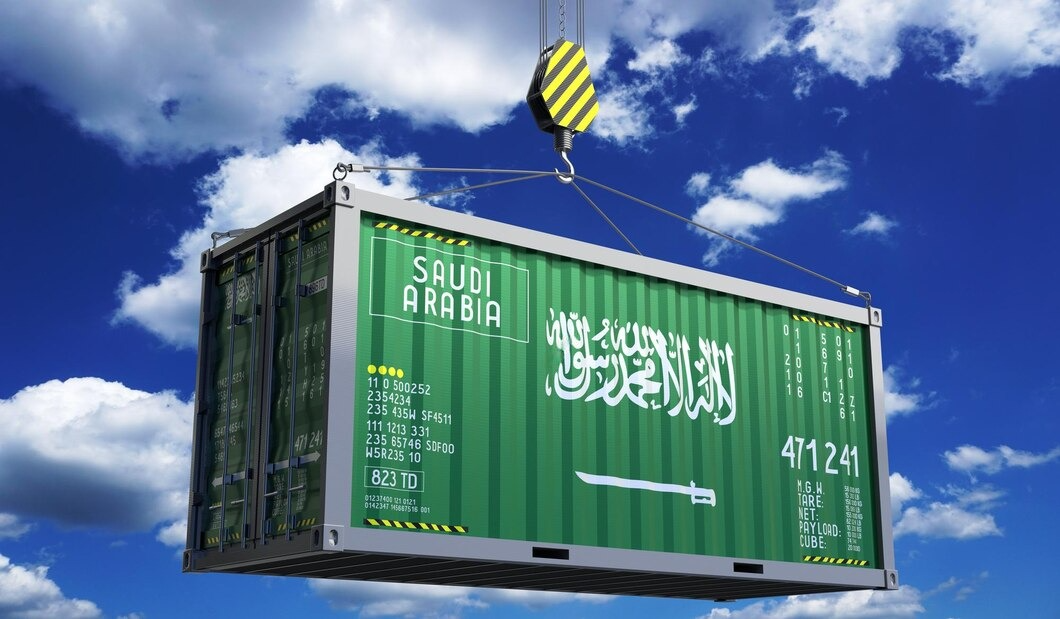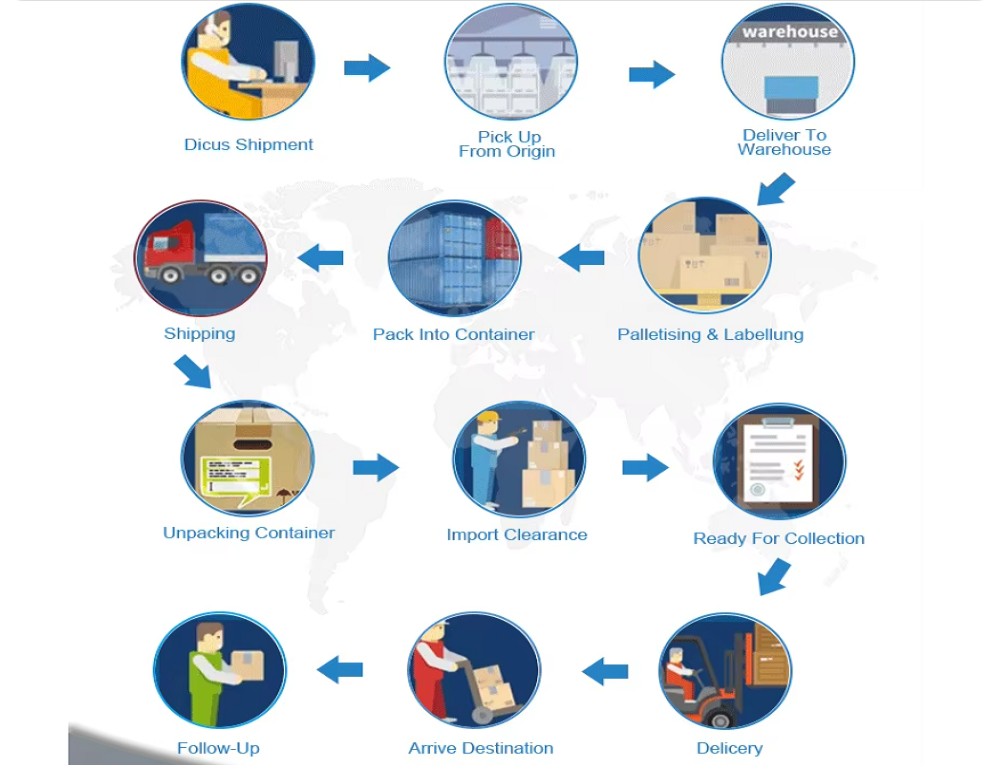Shipping from China to Saudi Arabia
Shipping from China to Saudi Arabia has indeed become a crucial element in fostering economic growth and mutual trade between the two nations. With bilateral trade reaching nearly $87.3 billion in 2021, key sectors such as petroleum products and machinery have played a significant role in driving this interaction, leading to boosted employment and GDP in both countries. Furthermore, platforms like Alibaba have revolutionized the trade dynamics, making it easier for businesses of all sizes to access the global market. These platforms streamline logistics and customs processes, making international trade more accessible and efficient, and significantly enhancing the variety of goods shipped. Overall, this has had a positive impact on the economic relationship between China and Saudi Arabia.
Viputrans is one of the top China freight forwarder logistics companies, which provides professional shipping services from China to Saudi Arabia including air shipping to Saudi Arabia, sea freight to Saudi Arabia, and DDP shipping service to Saudi Arabia.aso VIPUTRANS has warehouse service to consolidate cargo, repackage service for label /logo change, and pallet service.

Sea Shipping from China to Saudi Arabia
Sea shipping FCL/LCL ocean freight shipping service from China with stable space and cheap price, warehouse consolidate service, a small volume in and big volume output, transit time 30-35dayshina to Saudi Arabia, it is the cheapest option to transport cargo from China to Saudi Arabia.

Air Shipping from China to Saudi Arabia
Air shipping from China to Saudi Arabia and cargo plane charter service freight forwarding for viputrans.
it is suitable for urgent and high-cost cargo. transit time is very fast around 3-9 days, viputrans has contracts with several airlines SV, RX, CA, MU, EK TR, CZ KU, etc, and keeps stable space and fast transit time to meet the requirements of customers.

DDP shipping from China to Saudi Arabia
Door-to-door shipping from China to Saudi Arabia includes customs clearance and duties in the Saudi Arabia warehouse.
air shipping DDP 7-15days UDS4-USD9/KG
sea shipping DDP 25-35days USD150-USD 280/CBM
| How to Start Working with Viputrans |
| 1. Choosing Warehouse | Choose the warehouse based on the location of your supplier, weight, and volume of your goods |
| 2. Picking up | Picking up the goods from your various suppliers |
| 3. Stuffing | Stuffing the goods into the container and consolidating them as same one shipment |
| 4. Customs Clearance | Clearing customs for each cargo |
| 5. Loading | Loading the goods on a vessel or flight |
| 6. Document | Making the total document(Bill of lading, AWB, Packing list, commercial invoice or C/O) |
| 7. Customs Entry | Arrange the customs entry |
| 8. Delivery | Delivering the cargo to your facility |

How to Choose the Best Shipping Mode from China to Saudi Arabia?
| Shipping Mode | Cost Range | Best For |
|---|
| LCL (Less than Container Load) | Approximately $100-$200 per cubic meter | the volume of the shipments that do not require a full container, 1CBM>volume <10CBM |
| FCL – 20-foot container | Around $800-$1500 | Larger shipments that can fill a 20-foot container |
| FCL – 40-foot container | Approximately $1500-$3000 | Larger shipments that can fill a 40-foot container |
| Express Shipping DHL/FEDEX/ARMAX | Around $5-$8 per kilogram | Urgent and small sample shipments requiring fast delivery times and small parcel delivery for online shopping |
| Air Freight from China to Arabia | Typically $3-$5 per kilogram | Faster than sea freight but more cost-effective than express shipping for medium to large shipments |
| Door to Door cargo from China to Saudi Aramex | sea freight DDP from China to Saudi Arabia: about 150-280USD/CBM; Air shipping DDP is about 4-9usd/kg | Sensitive and small cargo, as customers who didn't have an import license
|
Benefits of LCL and FCL Shipping
Sea freight offers an efficient solution for transporting large quantities of goods between China and Saudi Arabia. With options such as Less than Container Load (LCL) and Full Container Load (FCL), businesses can choose the best shipment size and budget constraints for their needs.
| Shipping Mode | Description | Cost Range |
|---|
| LCL | Shipments share container space, ideal for smaller loads | $100-$200 per cubic meter |
| FCL – 20-foot | Exclusive container for one shipper enhances security | $800 to $1500 per container |
| FCL – 40-foot | Larger exclusive container reduces potential damage | $1500 to $3000 per container |
September 2024 Shipping Update: Air Freight From China to Saudi Arabia
Advantages of Air Freight from China to Saudi Arabia
The fastest mode of transport, sea freight takes 20 to 25 days, while air freight takes 3 to 7 days
The freight network covers the world and can deliver goods almost anywhere.
Easy to track goods, very reliable arrival and departure times
Delivery schedules are reliable, as the departure and arrival of aircraft are only affected by bad weather
No LCL shipping is involved, less warehousing, and fewer inventory items are required.
Air freight requires less packaging than sea freight
Low insurance premiums save you a lot of money.
Safer High level of security, reduced risk of theft and damage.
Air Cargo from China to Saudi Arabia, How Long Will It Take?
| Origin City | Destination City | Shipping Time (Days) |
|---|
| Shanghai-Pudong | Dammam (DMM) | 3-9days |
| Guangzhou | Riyadh(RUH) | 3-9days |
| Beijing | Jeddah (JED) | 3-9day |
| Chengdu | Medina (MED)
| 3-9days |
| Qingdao | Dubai International | 1day |
Air Freight Service from China to Saudi Arabia
We can export general cargo, special cargo and battery cargo. We cooperate with the following carriers: HU, CZ, CZ, MU, EK, EY, CX, LH, SQ, BA, TK, etc. We provide professional air freight services to customers all over the world, whether you need fast service or affordable service, we can provide the best price.
We can provide you with self-operated, one-stop international charter services from Hong Kong, Shenzhen, Guangzhou, Shanghai, Beijing, Xiamen and other airports to Saudi Arabia.
How to Calculate the Chargeable Weight Using Both the Gross Weight and Volumetric Weight Methods:
| Method | Description |
|---|
| Gross Weight | The actual weight of the goods is measured in kilograms (KG). |
| Volumetric Weight | Calculated using the formula: 1 CBM = 167 KG. |
To determine the chargeable weight, compare both the gross weight and the volumetric weight, and use the greater of the two.
To calculate the chargeable weight:
Gross Weight: The actual weight of the shipment.
Volumetric Weight: Calculate by converting the volume of the shipment into weight (CBM x 167 KG).
Chargeable Weight: The higher value between gross weight and volumetric weight.
| Origin | Destination | Gross Weight (KG) | Volumetric Weight (1 CBM = 167 KG) | Chargeable Weight | Rate per KG | Estimated Cost |
|---|
| Example City | Riyadh | 500 | 600 | 600 | $4 | $2,400 |
Information on Specific Air Freight Saudi Arabian Airports
| Airport Name | Airport Facts | Connected Airports in China |
|---|
| Riyadh King Khalid International | · Located 35 km north of Riyadh. · Features advanced cargo facilities for perishable goods. · Handles millions of passengers annually. | Beijing-Capital, Shanghai-Pudong, Guangzhou |
| Jeddah King Abdulaziz International | · Major gateway to Mecca. · Recently expanded with a new terminal. · Equipped to handle all types of cargo. | Shenzhen, Chengdu, Wuhan |
| Dammam King Fahd International | · Largest airport in the world by land area. · Modern cargo village with extensive facilities. · Supports high cargo volumes. | Shanghai-Pudong, Guangzhou, Beijing-Capital |
Import requirements of Saudi Arabia:

The following are some of the chief requirements for import in Saudi Arabia;
Verified and Triplicate Original Invoice: Importance for Customs Clearance
This means that the original invoice has been verified and validated by the trade authority of the exporting country. It is an important document for customs clearance and verifying the value of the goods being exported. Having it attested in triplicate means there are multiple copies for various parties involved in the export process.
The invoice should include details such as the value, weight, description, and brand of the goods.
The invoice includes the details of the goods being shipped.
Bill of Lading and Airway Bill: Essential Documents for Goods Transportation
A bill of lading is a legal document issued by a carrier to a shipper that details the type, quantity, and destination of the goods being carried. It serves as a receipt for the goods, a contract of carriage, and a document of title. An airway bill is a similar document used for air freight shipments. Both documents are important for tracking and transferring ownership of the goods during transit.
Insurance Certificate: Proof of Coverage for Goods and Property
An insurance certificate is a document that serves as proof that goods or property are insured. It outlines the details of the insurance coverage, such as the type of insurance, coverage limits, and effective dates. It is often required when shipping goods internationally or when entering into contracts that require insurance coverage. Having an insurance certificate provides peace of mind and protection in the event of loss or damage to the insured goods.
Steamship Certificate: Essential Details for Vessel's Journey to Saudi Arabia
A steamship certificate is an official document that outlines important details about a vessel's journey. It includes the name of the vessel, its nationality, the name of the owner, the port of loading, and the ports it will touch on its route to Saudi Arabia. This certificate serves as a record of the ship's journey and is used for official and legal purposes. It is an important document for ensuring the safety and compliance of the vessel during its voyage.
Certificate of Conformity (CoC): Ensuring Compliance for Export to Saudi Arabia
A Certificate of Conformity (CoC) is a document that verifies a product's compliance with approved Saudi and International standards. In the context of Saudi Arabia, this document is specifically referred to as the SASO CoC, or Saudi Arabia Certificate of Conformity. This certification is important for goods being exported to Saudi Arabia, as it ensures that they meet the necessary quality and safety requirements. Obtaining a SASO CoC demonstrates a commitment to meeting the standards set forth by the Saudi government and helps facilitate the smooth importation of goods into the country.
Certificate of Origin: Verifying the Product's Country of Manufacture
A certificate of origin of goods is a document that confirms the country in which a product was manufactured. It is typically attested by the relevant chamber of commerce of the exporting country. This document is important for customs and trade purposes, as it provides proof of the product's origin and may be used to determine eligibility for preferential trade agreements or tariffs.
Country of Origin Label: Transparency and Compliance in International Trade
The irremovable label showing the country of origin is a requirement for imported commodities in many countries. It provides important information to consumers about where the product was made and helps ensure compliance with trade regulations. This label is meant to be a transparent way for consumers to make informed purchasing decisions and for governments to track the flow of goods across borders.
Importance of Checking Expiration Dates and Ingredients for Food Safety
It is important to always check the expiration date on edible items before consuming them. This date indicates the last day the product is guaranteed to be at its highest quality and safe to eat. Additionally, it is crucial to read the ingredients list to ensure that the product does not contain any allergens or ingredients that may be harmful to your health. By being mindful of expiration dates and ingredients, you can make informed decisions about the food you consume and reduce the risk of foodborne illnesses.
Sample Submission for Import Approval: Ensuring Compliance with Safety and Quality Standards
Before importing certain types of goods, it is important to note that you may need to submit samples to the relevant government departments and ministries for approval. This is a crucial step in ensuring that the goods meet safety, quality, and regulatory standards before they can be imported into the country. It is important to research and understand the specific requirements and regulations for the goods you are looking to import to ensure a smooth and compliant import process.

How to import goods from China to Saudi Arabia:
Once you have fulfilled the necessary legal obligations to import goods from China, you can place an order with the Chinese company and send an advance payment, typically around 30% of the total order value. This can be done through a bank transfer or a letter of credit. Once the goods are ready for shipment, you will need to send the remaining balance and provide instructions for the Chinese exporter to ship to Saudi Arabia. It's important to ensure all necessary documentation and paperwork is to facilitate a smooth import process.
Custom regulations in Saudi Arabia:
Like any other country, the import of goods is subject to certain custom regulations in Saudi Arabia as well. We present some important regulations below;
1. All imported goods must be accompanied by a commercial invoice, packing list, and certificate of origin.
2. Certain goods may require additional documentation or permits, such as pharmaceuticals, food products, and chemicals.
3. The import of certain goods, such as firearms, alcohol, and pork products, is strictly prohibited.
4. Some goods may be subject to import duties, which can vary depending on the type of product and its country of origin.
5. Saudi Arabia also has specific regulations for the import of vehicles, including requirements for vehicle registration and inspection.
6. It is important to be aware of any restrictions or requirements for specific goods before importing them into Saudi Arabia to avoid any delays or issues at customs.
Custom duty in Saudi Arabia:
Customs Duty Exemptions for Basic Food and Consumer Items in Saudi Arabia
Saudi Arabia does not impose custom duties on most basic food and consumer items, including staples like wheat, rice, meat, sugar, tea, barley, unroasted coffee, and cardamom. This is to ensure that these essential items remain affordable for consumers.
Average Customs Duty Rate of 4.85% (Excluding Agricultural Products) for Imports
The average custom duty for most items, excluding agricultural products, is 4.85%. This means that when importing goods into a country, you can expect to pay this percentage of the item's value as a customs duty. It's important to factor in these costs when calculating the total cost of importing goods.
Promoting Local Industry: 20% Customs Duty on Select Locally Produced Items
The government has imposed a customs duty of 20% on certain items that are produced locally to support the local industry. This measure is intended to protect domestic producers from foreign competition and promote the growth of local businesses. By imposing this duty, the government aims to encourage consumers to purchase locally-made products and support the country's economy.
Custom Duty Calculation Methods: Ad Valorem and Weight/Measurement-Based
Custom duties are typically calculated as a percentage of the Cost, Insurance, and Freight (CIF) value of imported goods, which is known as an ad valorem duty. However, for some items, custom duty is based on the weight and measurements of the goods being imported. It's important to be aware of these different methods of calculation when importing goods in order to accurately assess the potential costs.
Bilateral Trade Agreements: Promoting Regional Trade with Preferential Tariffs in Saudi Arabia
Saudi Arabia has signed bilateral trade agreements with certain Arab and GCC member states in order to promote regional trade. These agreements often include preferential and low tariffs for the involved countries, which helps to facilitate trade and strengthen economic ties within the region. This initiative aims to enhance cooperation and economic integration among the participating countries.
HS Code in Saudi Arabia:
The HS code system, which stands for harmonized commodity description and coding system, is widely used throughout the world as an internationally recognized product nomenclature developed by the World Customs Organization. Saudi Arabia also recognizes and applies this system, which helps facilitate international trade and standardize the classification of goods for customs and tariff purposes. It is an essential tool for ensuring the smooth flow of goods across borders and is used by customs authorities, importers, exporters, and logistics professionals worldwide. Saudi Arabia too recognizes this system and applies it.
FAQ: Shipping from China to Saudi Arabia
What are the main shipping options from China to Saudi Arabia?
Sea freight is a common method for shipping larger shipments, with options like Less than Container Load (LCL) and Full Container Load (FCL) available. Air freight is ideal for urgent or high-value items, providing faster delivery. Express shipping is the quickest option for time-sensitive goods. Each method offers its own benefits and considerations depending on the specific needs of the shipment.
How long does it typically take to ship goods from China to Saudi Arabia?
Sea freight is generally the most cost-effective option for shipping goods internationally, but it does require a longer transit time. Air freight, on the other hand, is much quicker but can be more expensive. Express shipping offers the fastest delivery, but it comes with a higher price tag. It's important to consider these factors when deciding on the best shipping method for your needs.
What are the average costs of shipping from China to Saudi Arabia?
Sea freight costs can vary depending on the type of shipment. For LCL (less than container load) shipments, you can expect to pay between $100 and $200 per cubic meter. For FCL (full container load) shipments, the costs can range from $1,500 for a 20-foot container to $4,000 for a 40-foot container. If you are considering air freight, the typical cost is about $4 to $6 per kilogram. For express shipping, the rates are usually higher, ranging from $5 to $8 per kilogram. It's important to consider these costs when planning your shipping strategy.
What documents are required for shipping from China to Saudi Arabia?
The required documents for this shipment include a commercial invoice, which lists the contents and value of the goods being shipped. Additionally, a packing list detailing what is in each package is necessary. A bill of lading or air waybill serves as the contract of carriage, and a certificate of origin is required to verify that the products were manufactured in China. It's important to ensure that all of these documents are accurately filled out and submitted to the appropriate parties for smooth processing of the shipment.
How do I handle customs clearance when shipping from China to Saudi Arabia?
To handle customs clearance effectively, it is important to ensure that all shipment documents are complete and accurate. This includes invoices, packing lists, and any necessary permits or licenses. Additionally, it is crucial to classify goods properly using Harmonized System (HS) codes, which are used to determine the duties and taxes applicable to the goods. Finally, considering employing a customs broker who is familiar with Saudi customs regulations can help streamline the clearance process and ensure compliance with local requirements. By following these steps, you can help ensure a smooth and efficient customs clearance process for your shipments.
Are there any specific packaging requirements for shipping to Saudi Arabia?
It is important to ensure that the packaging used for shipping is robust and secure to withstand long transit times and handling at multiple points. For sea shipments, it is advisable to use waterproof materials to protect the contents from moisture. Additionally, it is important to clearly label each package with handling instructions and destination details to ensure proper handling and delivery. This will help to minimize the risk of damage or loss during the shipping process.
Can I track my shipment from China to Saudi Arabia?
Yes, you can track your shipment from China to Saudi Arabia. Most shipping companies and carriers provide online tracking services that allow you to monitor the progress of your package as it travels from one country to another. You can usually track your shipment using a tracking number provided by the shipping company or carrier. Keep in mind that tracking information may have some limitations depending on the shipping method and the specific carrier used for the shipment. It's always a good idea to check with your shipping provider for specific tracking options and details.










